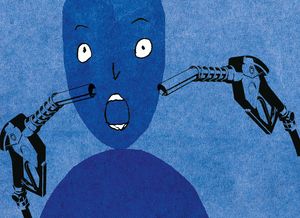Narendra Modi has repeatedly told his ministers and officers that he will not take back decisions made after due consideration. He has rebuffed them when they plead for U-turns in government policy, even saying he is not a rollback prime minister, hinting at his current fierce critic Yashwant Sinha, who was called a rollback minister when he handled finance under Atal Bihari Vajpayee at the turn of the century. The stubborn streak is once again evident in the way the government is responding to the demands for cutting growing petrol and diesel prices.
Petroleum Minister Dharmendra Pradhan has the prime minister’s authority to rule out any change in the policy of daily changes in fuel prices, depending on market conditions. When the prices were brought down by a paisa, it earned the government much ridicule. But, Pradhan said he would not change the policy, as fuel prices keep changing in most countries on a daily basis. Ministry officials argue that, say, in the United States, the prices vary from one petrol pump to another. Also, Modi would not budge on reducing central taxes on petrol and diesel, even though critics point out that the government has earned Rs 6 lakh crore through these levies. Earlier, he was equally adamant on demonetisation, and even spurned suggestions from the Supreme Court for extending the deadline for exchange of notes withdrawn from circulation. Even the most powerful court gave up when faced with a stern government.
Conspiracy theorists say the whole fuel economy is a make-believe game, as the balance sheets of oil marketing companies hide a lot of income and inflate subsidy figures, and that the money is used for secret operations including espionage abroad and for propping up resistance groups in different countries. But, ministry officials pooh-pooh the argument, saying money to be used for military purchases as well as for covert operations by R&AW and Intelligence Bureau comes from other provisions made in the budget. The Centre, however, relies on taxing petroleum products because collections are easier, and states have their separate cess on petrol and diesel. There have been suggestions that all petroleum products should come under the Goods and Services Tax, so that a permanent rate of tax can be fixed. But, neither the Centre nor the states are keen on losing a cash cow.
There is some unease in the BJP about the volatile dollar situation, which can push petrol prices to a record Rs 100 per litre. Many leaders feel that one person who can persuade Modi to be more flexible is party president Amit Shah, who had intervened on lowering the GST rates on several goods. Since Shah is the electoral calculator of the party, he can work out the equation of votes lost to each rupee hike in petrol and diesel prices. But, at the moment, the government’s signal is that Modi is not bending sideways or backwards on fuel prices.
sachi@theweek.in


